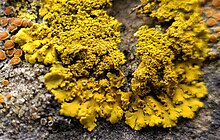| Rusavskia sorediata | |
|---|---|

| |
| Scientific classification | |
| Domain: | Eukaryota |
| Kingdom: | Fungi |
| Division: | Ascomycota |
| Class: | Lecanoromycetes |
| Order: | Teloschistales |
| Family: | Teloschistaceae |
| Genus: | Rusavskia |
| Species: | R. sorediata |
| Binomial name | |
| Rusavskia sorediata (Vain.) S.Y.Kondr. & Kärnefelt (2003) | |
| Synonyms | |
List
| |
Rusavskia sorediata is a species of saxicolous (rock-dwelling), crustose lichen in the family Teloschistaceae. It is widely distributed in the Northern Hemisphere.
The lichen was first formally described by the Finnish lichenologist Edvard August Vainio in 1881, as Lecanora elegans var. sorediata. Gustaf Einar Du Rietz transferred it to Caloplaca in 1916. Josef Poelt considered it better in genus Xanthoria, and it was known by that binomial for several decades. In 2003, Sergey Kondratyuk and Ingvar Kärnefelt transferred it to their newly circumscribed genus Rusavskia.
The lichen develops small, spherical pustules on its surface, which eventually become granular soredia. These soredia can range in abundance from hardly there to covering nearly the entire thallus surface. Because of the characteristic appearance imparted by these granular propagules, in North America, a common name used for this species is sugared sunburst lichen. Rusavskia sorediata has an Arctic-oreophytic distribution; "oreophytic" refers to plants (and by extension, lichens or other organisms) that are adapted to live in mountainous regions, especially those growing above the forest line but below the permanent snow line. It has been recorded in Asia, Europe, North America, and Greenland.
References
- ^ "GSD Species Synonymy. Current Name: Rusavskia sorediata (Vain.) S.Y. Kondr. & Kärnefelt, Ukr. bot. Zh. 60(4): 434 (2003)". Species Fungorum. Retrieved 10 February 2024.
- "Rusavskia sorediata (Vain.) S.Y. Kondr. & Kärnefelt". Catalogue of Life. Species 2000: Leiden, the Netherlands. Retrieved 10 February 2024.
- Kondratyuk, S.Y.; Kärnefelt, I. (2003). "Revision of three natural groups of xanthorioid lichens (Teloschistaceae, Ascomycota)". Ukrainskiy Botanichnyi Zhurnal. 60 (4): 427–437.
- Brodo, Irwin M.; Sharnoff, Sylvia Duran; Sharnoff, Stephen (2001). Lichens of North America. Yale University Press. pp. 747–748. ISBN 978-0-300-08249-4.
- Giralt, Mireai; Nimis, Pier Luigi; Poelt, Josef (1993). "Studien über einige arten der Fletchengattung Xanthoria mit Isidiiformen vegetativen Diasporen". Journal of the Hattori Botanical Laboratory (in German). 74: 271–285. doi:10.18968/jhbl.74.0_271.
- Czeczuga, Bazyli; Jacobsen, Peter. "Carotenoids in West Greenland lichens". Arctic and Alpine Research. 25 (4): 413–415. doi:10.1080/00040851.1993.12003027.
| Taxon identifiers | |
|---|---|
| Rusavskia sorediata | |
| Lecanora elegans var. sorediata | |
| Caloplaca sorediata | |
| Xanthoria sorediata | |